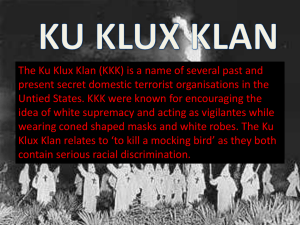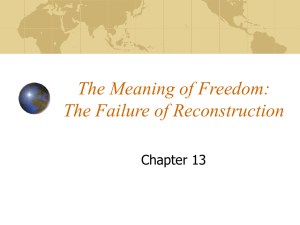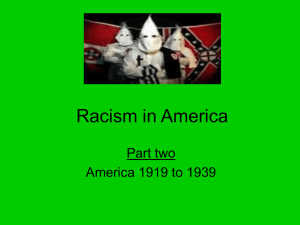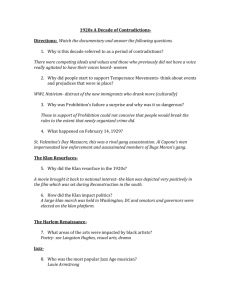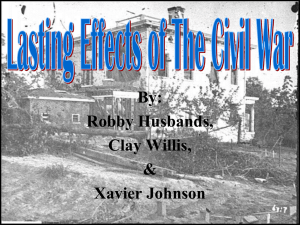THE KU KLUX KLAN - s3.amazonaws.com
advertisement
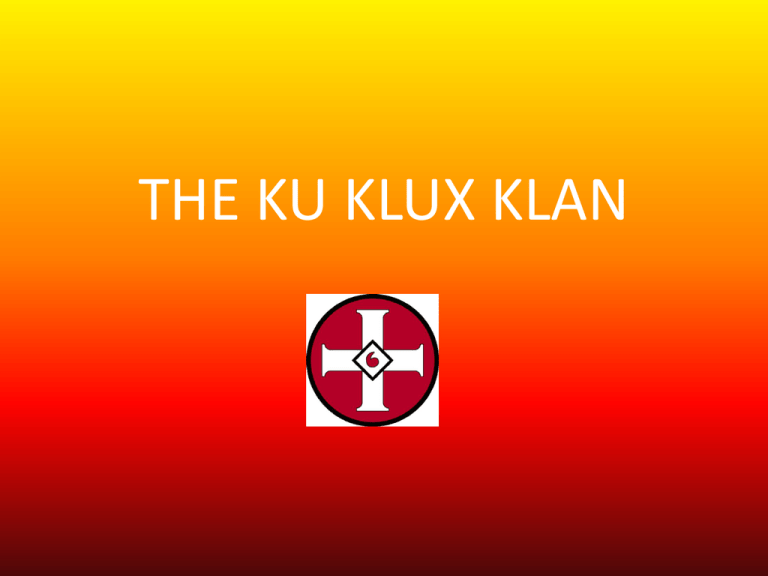
THE KU KLUX KLAN WHAT IS THE KU KLUX KLAN? The Ku Klux Klan was a secret terrorist organization that originated in the Southern states during the period of Reconstruction following the American Civil War (1861-1865). Their main goal was to restore white supremacy by threats and violence, including murder, against black and white Republicans. Klan members in Tennessee, 1866 CREATION AND NAMING The original Klan was organized in Pulaski, Tennessee, on December 24, 1865, by six welleducated Confederate veterans who gave their society a name adapted from the Greek word kyklos (circle). Although the Ku Klux Klan began as a prankish social organization, its activities soon were directed against the Republican Reconstruction governments and their leaders, both black and white, which came into power in the South in 1867. Klansman on horseback, 1868 Tennessee DEVELOPMENT OF THE KLAN Klan members gathered in Nashville, Tennessee in 1867 to try to create a national organization with local chapters. Most leaders were former members of the Confederate Army. Confederate General Nathan Bedford Forrest became Grand Wizard, claiming to be the Klan’s national leader. Despite these efforts at organization, local Klan units continued to operate autonomously. The Ku Klux Klan soon spread into nearly every southern state, launching a reign of terror against Republican leaders both black and white. Nathan Bedford Forrest Gifted at strategy and tactics, he was also accused of war crimes during the Civil War. MEMBERSHIP Lifting the Klan mask revealed a chaotic multitude of anti-black vigilante groups: •Disgruntled poor white farmers •Wartime guerrilla bands •Displaced Democratic politicians •Illegal whiskey distillers •Sadists •Rapists •White workmen fearful of black competition •Employers trying to enforce labor discipline •Common thieves •Neighbors with old grudges Ku Klux Klan attacking a black family inside their home. ITS PURPOSE The Klansmen regarded the Reconstruction governments as hostile and oppressive. They also generally believed in the innate inferiority of blacks and therefore mistrusted and resented the rise of former slaves to a status of civil equality, and often to positions of political power. Thus, the Klan became an illegal organization committed to destroying the Reconstruction governments from the Carolinas to Arkansas. APPEARANCE Members adopted white costumes: robes, masks, and conical hats, designed to be outlandish and terrifying, and to hide their identities and add to the drama of their night rides. Many of them operated in small towns and rural areas where people otherwise knew each other's faces, and sometimes still recognized the attackers. "The kind of thing that men are afraid or ashamed to do openly, and by day, they accomplish secretly, masked, and at night." With this method both the high and the low could be attacked. Ku Klux Klan costumes in North Carolina, 1870. The Ku Klux Klan night riders sometimes claimed to be ghosts of Confederate soldiers so, as they claimed, to frighten superstitious blacks. Few freedmen took such nonsense seriously. TACTICS Klansmen terrorized public officials in efforts to drive them from office. They attacked Freedmen’s Bureau members. They worked to curb the education, economic advancement, voting rights, and the right to bear arms of blacks. When such tactics failed to produce the desired effect, their victims might be flogged, mutilated, or murdered. THOUSANDS OF AFRICAN AMERICANS WERE KILLED In North and South Carolina, in 18 months ending in June 1867, there were 197 murders and 548 cases of aggravated assault. Klan violence worked to suppress black voting. More than 2,000 persons were killed, wounded and otherwise injured in Louisiana within a few weeks prior to the Presidential election of November 1868. After the murders, no Republicans voted in the fall elections. In Hinds County, Mississippi, alone, whites killed an average of one black per day, from 1865 to 1867. In Louisiana, white Democrats killed 1,081 people in 1868, mostly blacks and white Republicans. Riots were staged; their causes were always obscure, their results always certain: ten to one hundred times as many Negroes were killed as whites. In 1866, Memphis, Tennessee, whites on a rampage of murder killed 46 Negroes, most of them veterans of the Union Army. Five Negro women were raped. 90 homes, 12 schools, and 4 churches were burned. In New Orleans, in the summer of 1866, another riot against blacks killed 35 Negroes and three whites. The violence mounted through the Late 1860s and early 1870s as the Klan organized raids, lynchings, beatings, burnings. For Kentucky alone, between 1867 and 1871, the National Archives lists 116 acts of violence. Masked men shot into houses and burned them, sometimes with the occupants still inside. They drove successful black farmers off their land. By 1868, two years after the Klan's creation, its activity was beginning to decrease. Members were hiding behind Klan masks and robes as a way to avoid prosecution for freelance violence. Many influential southern Democrats feared that Klan lawlessness provided an excuse for the federal government to retain its power over the South, and they began to turn against it Many southern states began to pass anti-Klan legislation. The Civil Rights Act of 1871 was passed by President Grant, and Klansmen were arrested and prosecuted. Three Ku Klux Klan members arrested in Mississippi, September 1871, for the attempted murder of an entire family. By 1872, the Klan was broken as an organization. Nonetheless, the goals that the Klan had failed to achieve itself, such as suppressing suffrage for Southern blacks and driving a wedge between poor whites and blacks, were largely accomplished by the 1890s by militant Southern whites. Lynchings of African Americans, far from being ended by the Klan's disintegration, continued, with over 100 lynchings per year throughout the 1880s, and peaked in 1892 with 161 deaths. KARMA ?
